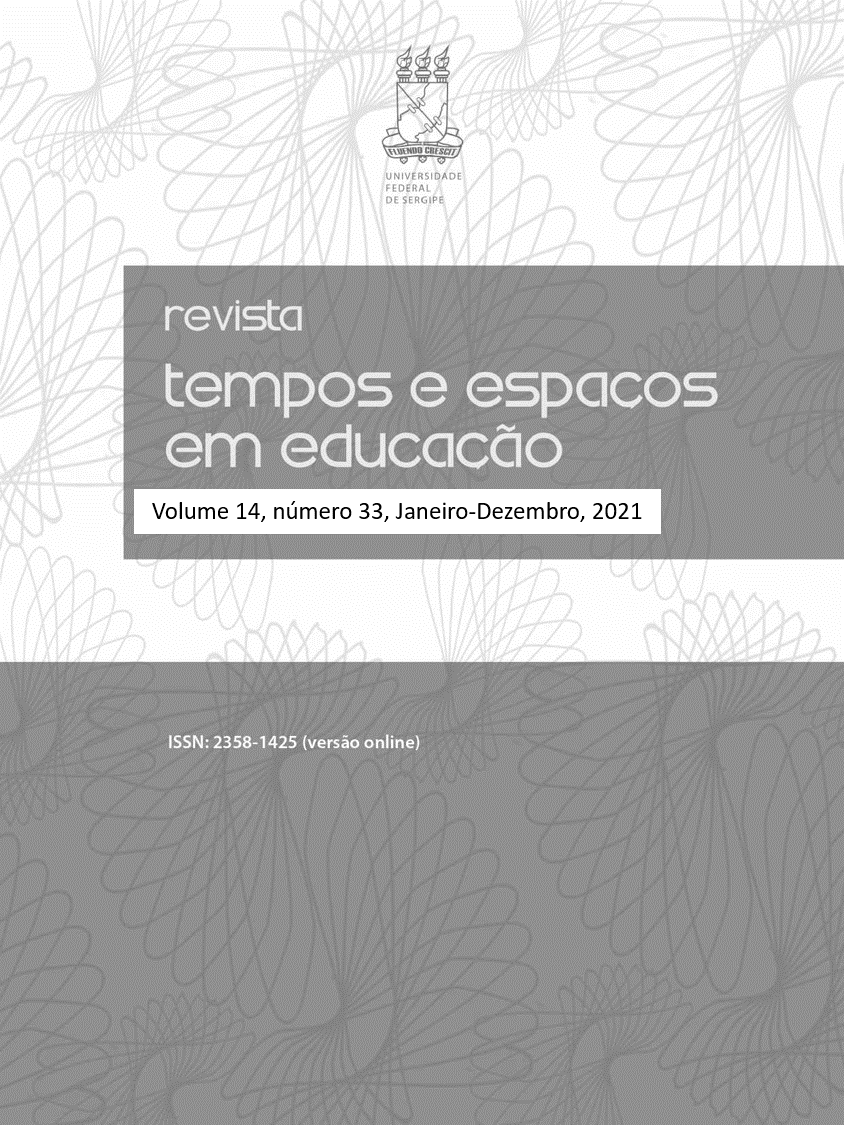Saberes da pesquisa e aprendizagem significativa: um percurso pela formação de professores
DOI:
https://doi.org/10.20952/revtee.v14i33.16278Palavras-chave:
Aprendizagens significativas, Estado da questão, Formação continuada, Professor(a) de matemática, Saberes da pesquisaResumo
O artigo traz discussões sobre os Saberes da pesquisa na formação continuada de professores(as) de Matemática para Aprendizagens Significativas. É uma revisão de literatura que levantou a seguinte indagação para a construção do Estado da Questão: o que já existe produzido academicamente sobre as contribuições da prática da pesquisa para o desenvolvimento de aprendizagens significativas, considerando a prática pedagógica do(a) professor(a) de Matemática do 6º ano, em sua formação continuada? Objetivou mapear o que existe de produção científica sobre os Saberes da pesquisa na formação continuada de professores de Matemática para Aprendizagens Significativas. Para as buscas nas bases de dados aplicamos o recorte temporal 2000-2021. A discussão teórico-metodológica se sustenta em Ausubel (2003), Moreira (2012), Therrien (2010), dentre outros. Os resultados apontam que existe pouquíssima produção de trabalhos abordando as categorias Saberes da Pesquisa e Aprendizagem Significativa na discussão sobre os saberes do(a) professor(a) de Matemática, o que nos leva a considerar tratar-se de uma categoria ainda não consolidada. É necessário pesquisar, discutir e refletir sobre suas necessidades formativas.
Downloads
Referências
Ausubel, D. P. (2003). The acquisition and retention of knowledge: A cognitive view. Dordrecht: Kluwer Academic Publishers.
Ausubel, D. P. (2003). Aquisição e retenção de conhecimentos: Uma perspectiva cognitiva. Lisboa: Plátano Edições Técnicas. Translate to Portuguese of The acquisition and retention of knowledge: a cognitive view. (2000). Kluwer Academic Publishers. IBSN 972-707-364-6.
Barbosa, J. (org) (1998). Reflections on the multi-referential approach. São Carlos: UFSCAR.
Barreto, M. C. et al. (2013). The foundations of Activity Theory in the organization of Mathematics teaching. In: The formation of Mathematics teachers under different theoretical perspectives. Teresina: EDUFPI, 2013. p. 59-82.
Ben-chaim, D. & Bat-shevailany, Y. (2008). Authentic Investigative Activities for the Teaching of Ratio and Proportion in the Training of Mathematics Teachers for Elementary and High School Levels. Bolema, v.21, n.31, p.125-159. https://www.periodicos.rc.biblioteca.unesp.br/index.php/bolema/article/view/2108.
Bertini, L. F. (2009). Sharing knowledge in mathematics teaching in the early grades: A teacher in the context of investigative tasks. [Dissertation Masters Federal University of São Carlos. https://repositorio.ufscar.br/handle/ufscar/2472?show=full.
BRASIL. (1996). Law of Directives and Bases of National Education. Federal Law number 9394.
Camelo, Z. B. (2020). Pedagogical technological knowledge and content in the training of spatial geometry teacher. [Dissertation Masters State University of Ceará]. http://www.uece.br/ppge/wp-content/uploads/sites/29/2020/09/Dissertacao_ZELIA-BESERRA-CAMELO.pdf.
D’Ambrósio, U. (2009). Mathematics Education: From theory to practice. 17 ed. Campinas, SP: Papirus Editora.
Demo, P. (2002). Educate through research. 5 ed. Campinas: Autores Associados.
Demo, P. (2008). Participant research, knowing how to think and intervene together. Brasília: Liber Livro.
Fabrina, C. & Albernaz, R. M. (2010). Mathematics Teacher: knowledge in moving training. INTERthesis Magazine, v. 07, n. 01, p. 302-323.https://periodicos.ufsc.br/index.php/interthesis/article/view/18071384.2010v7n1p302.
Fiorentini, D. & Castro, F. C. de. (2003). Becoming a Mathematics Teacher: The Case of Allan in Teaching Practice and Supervised Internship, In: FIORENTINI, D. (org.) Mathematics teacher education: exploring new paths with different perspectives. Campinas, SP: Mercado das Letras.
Freire, P. (2011). Pedagogy of autonomy: knowledge necessary for educational practice. 43. ed. São Paulo: Paz e Terra.
Freire, P. (2011). Pedagogy of the Oppressed. 50. ed. São Paulo: Paz e Terra.
Kincheloe, J. L. & Berry, K. S. (2007). Education research: conceptualizing bricolage. Porto Alegre: ArtMed.
Gauthier, C. et al. (2006). For a Theory of Pedagogy: Contemporary research on teaching knowledge. 2 ed. Ijuí: Unijuí.
Moreira, M. A. (2012). Meaningful learning: Theory and complementary texts. São Paulo: Livraria Editora da Física.
Neto, O. Z. (2009). Time and knowledge: The constitution of the experienced teacher in mathematics. [Thesis doctoral São Paulo State University, Literature of Araraquara and Federal University of Rondônia]. https://repositorio.unesp.br/handle/11449/101578.
Nóbrega-Therrien, S. M. & Therrien, J. (2010). The state of the question: Theoretical-methodological contributions and reports of production in scientific works. In: FARIAS, Isabel Sabino de; NUNES, João Batista de Carvalho; NÓBREGA-THERRIEN, Silvia Maria. Scientific Research for Beginners: Walking the Maze. Fortaleza, EdUECE.
Pimenta, S. G. & Ghedin, E. (Org). (2002). Reflective Professor in Brazil: Genesis and critique of a concept. São Paulo: Cortez.
PONTE, João Pedro da. (1997). Perspectives of professional development of mathematics teachers in a process of curriculum change. In: Ponte P. et al. Professional development of mathematics teachers – what training? Lisboa: Sociedade Portuguesa de Ciências da Educação.
Ponte, J. P. da. (2009). Research on the Mathematics teacher: Problems and perspectives. I SIPEM - International Seminar on Research in Mathematics Education. São Paulo, Brasil.
Silva, R. V. da. (2016). Articulation of teaching and research in teaching practice: experiences and meanings of teachers in the teaching courses of the Federal Institute of Education of Piaui. [Dissertation Masters Federal University of Piaui]. https://repositorio.ufpi.br/xmlui/handle/123456789/446.
Silvano, A. M. (2019). Teacher knowledge and meaningful learning in initial teacher education using interactive digital interfaces. [Thesis Doctorate State University of Ceará].http://www.uece.br/ppge/wpcontent/uploads/sites/29/2019/06/Tese_ANTONIO-MARCOS-DA-COSTA-SILVANO.pdf.
Sousa, C. O. (2018). Continuing teacher education and the concept of space: Contributions from the Meaningful Learning theory. [Dissertation Masters State University of Ceará].
http://www.uece.br/ppge/wpcontent/uploads/sites/29/2019/07/Dissertação_CLEANGELA-OLIVEIRA-SOUSA.pdf.
Valente, W. R. (2008). Who are we Mathematics teachers? Cedes Journal, v.28, n.74, p.11-23. https://repositorio.ufsc.br/xmlui/handle/123456789/160379.
Wichnoski, P. (2017). Metasearch in mathematical research: an analysis from the abstracts. Mathematics Education Research Magazine, v.19, n.2, p.161-178. https://revistas.pucsp.br/index.php/emp/article/view/26347.
Publicado
Como Citar
Edição
Seção
Licença
À Revista Tempos e Espaços em Educação ficam reservados os direitos autorais pertinentes a todos os artigos nela publicados. A Revista Tempos e Espaços em Educação utiliza a licença https://creativecommons.org/licenses/by/4.0/ (CC BY), que permite o compartilhamento do artigo com o reconhecimento da autoria.



